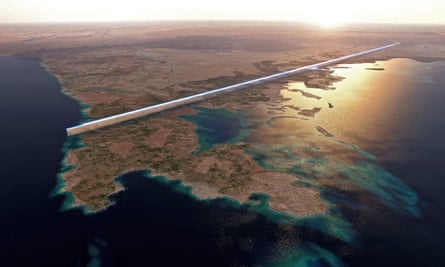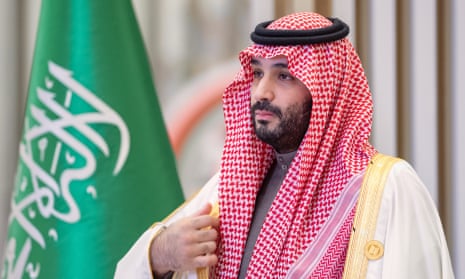Richard Edelman, the CEO of the $1bn public relations firm Edelman, published a blogpost in June reflecting on his trip to the elite gathering of the World Economic Forum in Davos, Switzerland. Russia had invaded Ukraine only months earlier and Edelman’s report focused on his geopolitical observations. “I left Davos inspired by the bravery of the Ukrainians and Poles,” Edelman wrote, “[and] more convinced than ever about the global rift between democracy and autocracy.”
That rift is real. Around the world, “autocracy is making gains against democracy”, as the human rights non-profit Freedom House put it. Yet the rift between democracy and autocracy that Edelman rightly identified has not stopped his company from signing at least $9.6m (£7.9m) worth of contracts over the past four years with one of the world’s richest autocracies: the kingdom of Saudi Arabia.
Freedom House named Saudi Arabia as one of the “worst of the worst” nations in the world for human rights and civil and political liberties. The Saudi government “really restricts almost all political rights and civil liberties and engages in arbitrary imprisonment, torture, [and] execution of perceived opponents”, said Michael Abramowitz, the president of Freedom House. “It’s a pretty grim picture.”
For those on the receiving end of Saudi repression, that picture has improved little since the October 2018 assassination and dismemberment of the Washington Post journalist Jamal Khashoggi, an operation that US intelligence concluded was “approved” by the Saudi crown prince, Mohammed bin Salman. Under the crown prince’s rule, “power has become much more concentrated than ever before in the history of Saudi Arabia”, said Sarah Leah Whitson, the executive director of Democracy for the Arab World Now (Dawn). “Any criticism of the government, any criticism of Mohammed bin Salman, is met with extreme repression.”
Over that same period, however, the picture presented by the Saudi government to influential American audiences has been brightened with the help of key contractors, including Edelman. Since Khashoggi’s murder, the powerful PR firm has received or is contracted to receive $9.6m (£7.9m) in fees from Saudi government agencies and companies controlled by the regime, according to a Guardian analysis of US Department of Justice documents made available by the watchdog group OpenSecrets.

The documents Edelman filed make it difficult to confirm exactly how much it has been paid by the Saudi government, and the company did not respond to a Guardian request for comment nor a request to provide an exact figure.
Most of Edelman’s work for the regime has focused on rehabilitating its reputation in the United States, an effort that the kingdom had begun before Khashoggi was killed by Saudi agents. In February 2020, Edelman registered as a foreign agent representing the Saudi Basic Industries Corporation, a chemicals manufacturer that is majority-owned by the government, to promote the “Business 20” gathering of executives, which took place that year in Riyadh.
The work, which was directed at American audiences and was projected to net Edelman more than $5.6m (£4.6m) in fees, included sending regular press releases that celebrated topics such as “mainstreaming women in business” and “doubling down efforts to empower women and youth”. One release featured a quote from Princess Reema bint Bandar Al-Saud, the Saudi ambassador to the United States, who “commend[ed] the B20 Saudi Arabia’s deep commitment to the empowerment of women”, including an “inclusive policy development process” that she hoped would “remain as one of the Saudi presidency’s lasting legacies”. The Saudi regime continues to imprison women’s rights activists, sometimes sentencing them to decades in prison for posting tweets critical of the government.
Later in 2020, Edelman agreed to provide Neom, a new $500bn (£414bn) city in north-western Saudi Arabia, with “strategic counsel”, “media relations”, “stakeholder identification and engagement”, and other branding and promotional work in the United States. Edelman originally signed a three-month contract; the firm has since agreed to at least two extensions that will continue its relationship with Neom through July 2023.
Neom is a priority of Prince Mohammed, who chairs Neom’s board of directors. Edelman’s foreign agent filings suggest that by the time its work is completed, the firm will have earned more than $3m from the company developing Neom. That company is owned by the country’s $620bn (£514bn) sovereign wealth fund, known as the Public Investment Fund (PIF). The crown prince also heads the PIF. In August, Politico reported that United Entertainment Group, a subsidiary of Edelman’s parent company, had previously been hired to help promote the controversial Saudi golf tour. LIV, like Neom, is financed by the PIF.
Neom’s development has “been accompanied by the mass displacement of the local indigenous population”, said Dawn’s Whitson. “Anyone who protests or questions this approach … has faced imprisonment and even death.” In October, less than two months after Edelman’s latest contract was signed, a Saudi court sentenced three Indigenous people to execution for refusing to be evicted for Neom construction.

On 31 May 2022, only days before Edelman published his blogpost warning of the growing divide between democracy and autocracy, he signed a $787,500 (£652,609) contract to provide the Saudi ministry of culture with “PR and communications services”. The ministry is led by Prince Badr bin Abdullah bin Mohammed bin Farhan Al-Saud, who is a “close friend” of the crown prince, according to the New York Times. Edelman’s work for the ministry included a promise to “research, identify and monitor online conversations and media coverage to identify ‘friends’ and detractors”, mainly in the US media. The Saudi government has a record of targeting, harassing and pursuing its critics abroad, including in the United States.
Edelman is far from the only US professional services firm doing business for the government of Saudi Arabia: McKinsey & Company, Boston Consulting Group, Hogan Lovells and Qorvis Communications are among the many others – but Edelman’s work for the regime is particularly notable given Edelman’s reputation for producing the “trust barometer”, an annual survey of public trust in government, business, the media and other institutions.
During this year’s gathering of the World Economic Forum, Edelman published a “special report” of the trust barometer focused on geopolitics. The company said that 59% of survey respondents agreed that “punish[ing] countries that violate human rights and international law” is a “business responsibility”.
Edelman, the CEO, has touted that finding in his recent blogposts and made similar arguments in his public comments, which have largely centered on Russia’s war against Ukraine. The widely promoted geopolitics report also found that nearly two-thirds of respondents believe that “CEOs should proactively curtail business activities in countries that commit human rights abuses rather than waiting for government to impose sanctions.”
As a member of the United Nations Global Compact, an initiative that encourages companies to make voluntary corporate responsibility pledges, Edelman publishes an annual update about its progress. Its most recent statement affirms that “respecting human rights is … an essential part of how we do business”. A December 2020 Edelman document outlining the “human rights policy” of Daniel J Edelman Holdings Inc, the parent organization of the PR firm, says that the company “expect[s] our clients to respect our human rights [olicy” and “reserves the right to refuse to work with clients, sectors, or industries that may jeopardize or violate the human rights of anyone”. The same document states Edelman’s “commitment to uphold human rights in every facet of our business, avoid directly or indirectly infringing on the human rights of others, and address negative impacts on human rights if they occur”.
In response to criticism for its years of work with fossil fuel companies and industry trade groups like ExxonMobil and the American Petroleum Institute, Edelman has said consistently that rather than rejecting these organizations as clients, the company believes it can better protect the planet by working with them and changing them from the inside.
It’s unclear whether Edelman takes the same change-from-within approach to authoritarian governments. In August, Edelman warned that “we are indeed in a competition with autocracies that may require each of us to sacrifice for the common good”. At an event marking the release of Edelman’s special report on geopolitics, the CEO highlighted the fact that 95% of respondents said businesses should “get out” of countries with repressive governments. The company routinely urges business leaders to take stands on human rights and other values. But it did not respond to a question from the Guardian about whether Edelman would commit to ceasing its lucrative work for the government of Saudi Arabia until the kingdom ends its abuses of human rights and civil liberties.
Whitson, the executive director of Dawn, said the Saudi state’s repression of political and civil society has “gotten a lot worse” in the years since Khashoggi’s assassination. “It is unprecedented, the level of fear that Saudi citizens are subject to, knowing the consequences for voicing any criticism, any objection to anything that [Mohammed bin Salman] is doing,” she said.
Based on his public comments, Edelman might be inclined to agree. As he concluded in a July blogpost about Russia’s invasion of Ukraine, “it is essential that we remember the very real human cost of repression”. But Edelman’s Saudi clients would be unlikely to encounter his words about autocracy or human rights: the CEO’s blogposts do not appear to be visible on the company’s Middle East website.
